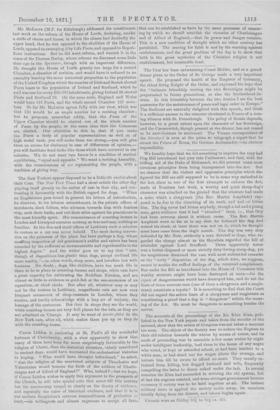The New Yorkers appear disposed to be a little tete
esalte'e about their Cats. The New York Times had a short article the other day piquing itself greatly on the cultus of cats in that city, and con- trasting it favourably with the British regard for dogs. " When an Englishman goes round to present his letters of introduction, he observes, to his intense astonishment, in the private offices of merchants, sleek felines, who advance towards him with fearless step, arch their backs, and rub their sides against his pantaloons in the most friendly spirit. His remembrance of counting-houses in London and Liverpool contains nothing so free and easy, nothing so familiar. In the dim and staid offices of Lothbury such a solecism in custom as a cat was never beheld. The most daring innova- tion on the primness of the place has been perhaps a dog, whose snuffling inspection of old gentlemen's ankles and calves has been recorded by the sufferers as unwarrantable and reprehensible in the highest degree." And the writer goes on to say that " cats, though of dispositions less plastic than dogs, accept civilized life more readily,"—in other words, sleep snore, and interfere less with business. No doubt ; dogs, like children, have too much life in them to be in place in counting-houses and shops, while cats have a great capacity for cultivating the Buddhist Nirvana, and are almost as little in evidence as gold-fish or the sea-anemones of an aquarium, or chief clerks. But after all, whatever may or may not he the custom in Lothbury, magnificent cats are now very frequent ornaments of shop-counters in London, where they receive, and hardly acknowledge with a lazy air of majesty, the homage of the customers. But then in shops they see the world, while counting-houses are very dull places for the cats, as they are not admitted on 'Change. It may be want of savoir-faire in the New York cats, after all, which makes them put up as they do with the counting-house.










































 Previous page
Previous page